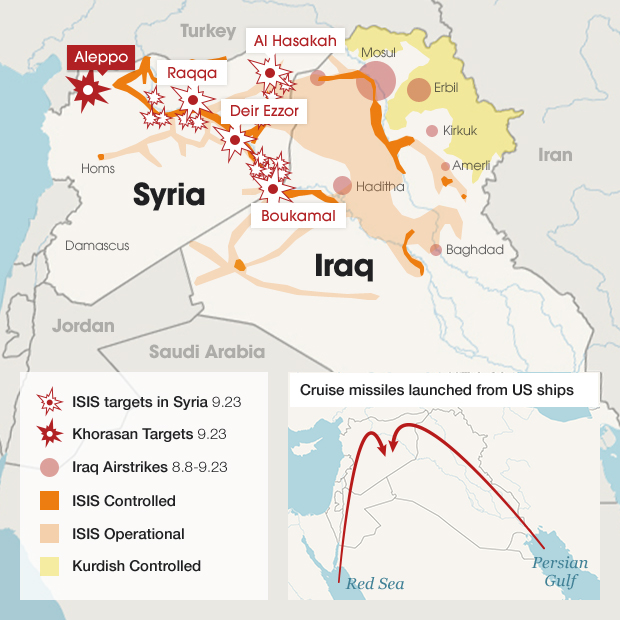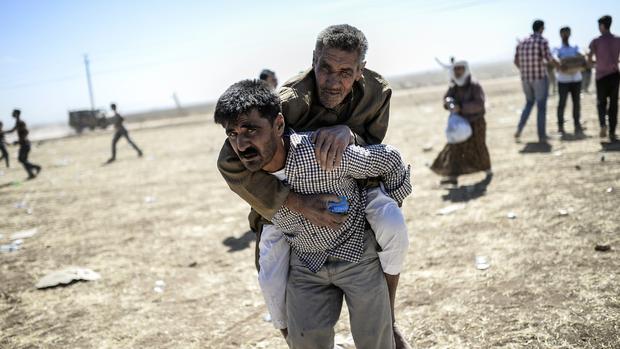ISIS on the move as airstrikes continue
BEIRUT -- U.S. warplanes bombed Islamic State militant positions on both sides of the Syrian-Iraqi border on Wednesday as hard-line Syrian rebels who have been battling the extremist group sought cover, fearing a wider aerial campaign against all fighters seen as a potential threat to the United States.
Syrian activists said aircraft conducted at least 10 strikes early Wednesday on suspected Islamic State of Iraq and Syria (ISIS) positions in an eastern town near the Iraqi border, and separately near Syria's northern border with Turkey.
The latest U.S. strikes, conducted by bombers and fighter jets, damaged eight Islamic State vehicles in Syria near the Iraqi border town of Qaim, the U.S. Central Command said in a statement. It also reported hitting two Islamic State armed vehicles west of Baghdad, as well as two militant fighting positions in northern Iraq.
In a separate statement, Pentagon spokesman Rear Adm. John Kirby said the strikes in eastern Syria hit a staging area used by the militants to move equipment across the border into Iraq.
He did not specify exactly where the air raids took place, but the Iraqi town of Qaim is across the border from the Syrian town of Boukamal, where Syrian activists reported at least 13 airstrikes on suspected Islamic State positions on Wednesday.
The Britain-based Syrian Observatory for Human Rights says it was not immediately clear who carried out the air raids Wednesday in and around Boukamal (also known as Abu Kamal), in ISIS' stronghold in eastern Syria
But the Observatory cited locals as saying the intensity of the air raids was similar to that of strikes on the town early Tuesday by the U.S.-led military coalition. CBS News' David Martin reported Wednesday that the U.S. had carried out at least one strike overnight on a staging area near the Iraqi border, in the vicinity of Boukamal.
There was no immediate comment from America's Arab allies as to whether any of their aircraft had take part in operations in the area, which could explain the higher number of strikes reported in the area by the Syrian Observatory.
Boukamal is located on the Syria-Iraq border. ISIS, which is also known as ISIL and which calls itself simply the "Islamic State," controls both sides of the frontier.
To the north, along the Turkish border, the Syrian Observatory said local sources had reported airstrikes near the town of Kobani by planes flying into the area from the Turkish side. The reports could not be confirmed and Turkey denied any use of bases in its territory.
There were also reports of strikes against ISIS positions to the east of Aleppo on Wednesday morning, but again it was unclear who might be carrying them out.
Kurdish forces have been battling ISIS militants trying to advance on Kobani, also known as Ayn al-Arab, and the leader of those forces told Reuters on Wednesday that the militants had received reinforcements from further south in Syria.
"The number of their fighters has increased, the number of their tanks has increased since the bombardment of Raqqa," Ocalan Iso told Reuters in a telephone interview.
He said ISIS was reinforcing its positions around Kobani with fighters and hardware moved up to the border from Raqqa -- the militant group's base of operations and one of the areas hit hard by U.S. and allied Arab nations' airstrikes the previous day.
"Kobani is in danger," Iso told Reuters, calling for the U.S. and its allies to lend their air power to help defend the city.
Reporting Wednesday from inside Turkey, just across the border from Kobani, CBS News' Holly Williams said residents speaking to her by telephone said ISIS was shelling the outskirts of the town. More than 130,000 Syrian refugees have already streamed over the border into Turkey in recent days, trading the threat from ISIS for the hard conditions of makeshift camps inside mosques and schools.
Williams reported that the United Nations fears as many as 400,000 refugees could try and pour into Turkey Kobani falls to the militants.
On Wednesday, the Nusra Front said it was evacuating its compounds near civilian areas in Idlib province in northwestern Syria. The announcement, made on a Facebook page associated with the group's Idlib operations, follows a U.S. airstrike on a Nusra Front base in the village of Kfar Derian that killed around a dozen fighters and 10 civilians, according to two activists.
Another Syrian rebel group, Ahrar al-Sham, was also clearing out of its bases, weapons workshops and offices, according to the Observatory. It said the group issued a statement calling for fighters to limit the use of wireless communication devices to emergencies, to move heavy weapons and conceal them, and to warn civilians to stay away from the group's camps.
An activist in Idlib who goes by the name of Mohammed confirmed that Ahrar al-Sham was evacuating its bases throughout the northern area. He said he was not aware of any strikes against the group, but said the fighters thought they would be targeted by the coalition because of their ultraconservative Islamic beliefs.
Ahrar al-Sham has been among the steadiest and most effective forces fighting to oust President Bashar Assad in Syria's civil war. It has also been on the front lines of a nine-month battle in northern Syria against ISIS. But the U.S. has long looked askance at Ahrar al-Sham, considering the group too radical and too cozy with the Nusra Front.
The U.S.-led campaign in Syria has drawn a mixed response from the country's multitude of rebel brigades, many of whom cooperate with the Nusra Front and have been locked in a deadly fight with ISIS militants since January. But the rebels' ultimate goal is to topple Assad, while the U.S. is focused on defeating ISIS.
On Wednesday, the main Western-backed Syrian opposition group criticized the American-led airstrikes for being limited to ISIS and other extremists while leaving Assad's government untouched.
"We regret that the international community has come up with partial solutions to the Syrian conflict in which hundreds of thousands were killed or detained by the Assad regime," said Nasr al-Hariri, secretary general of the Syrian National Coalition.
In a statement, al-Hariri also said that any effort other than helping Syrians overthrow Assad will only fuel extremism.
The regrouping and redeployment of jihadist assets was predicted Wednesday by the U.S. military commander in charge of the strikes in Syria.
Martin reported that Joint Chiefs of Staff Director of Operations Lt. Gen. William Mayville made no secret of the fact that the first night of U.S. strikes would not be the last.
"You are seeing the beginnings of a sustained campaign and strikes like this in the future can be expected," he told reporters at the Pentagon.
American officials expect ISIS, and the other group targeted by U.S. missiles this week, the al Qaeda unit known as "Khorasan," to try and adapt quickly to the new military pressure from the air.
"They are a learning organization and they will adapt to what we've done and seek to address their shortfalls and gaps against our air campaign in the coming weeks," said Mayville of Khorasan, which was targeted further to the west in Syria, in the Idlib province west of the sprawling city of Aleppo.

